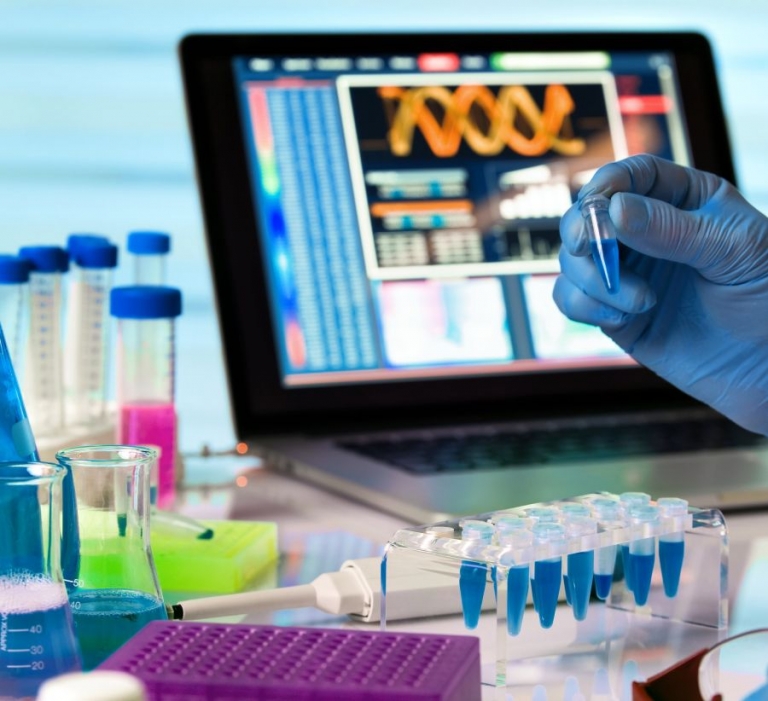Genetic laboratory tests, PCR tests
Why is laboratory testing important?
Laboratory tests can help identify or, where appropriate, rule out underlying diseases of certain symptoms.
However, it is important to emphasize that the result of a laboratory test does not in itself make a diagnosis, the finding only contains the results. You will receive the diagnosis, therapy or treatment recommendation from your specialist or treating doctor who orders the laboratory tests.
Contact your doctor with all laboratory test results!

Genetic tests
Genetic laboratory tests are suitable for determining predisposition to disease, which can help us do something to prevent the development of the disease (e.g. lifestyle changes, prevention).
A genetic test only needs to be performed once for everyone because our genetic store is a hereditary substance received from parents that does not change during our lives.
Molecular microbiological tests (PCR tests)
The presence of the microbe can be detected by a PCR test based on the DNA/RNA matter of the microbe.
PCR (polymerase chain reaction) is a molecular biology technology that allows a small piece of DNA to be amplified for analysis. In the case of infectious diseases, it can be performed immediately after infection, so that it is possible to make a diagnosis long before the onset of symptoms and start treatment in time. PCR technology makes it possible to detect infection even if the immune response is missed for some reason, or if the test does not give a false-positive result, even in the case of previous infections.
Available laboratory tests
Borrelia burgdorferi PCR
BRCA
CBS 844 ins 68 mutation
Chlamydia trachomatis (PCR)
Cystic fibrosis (CFTR) gene mutation
Celiac disease genetic test
Cytogenetic (chromosome karyotype) test
Clopidogrel anticoagulant drug, genetic PCR test to adjust drug level
DNA analysis of periodontitis-associated microbes, oral microbiome test
HBV-PCR
Hemochromatosis genetic test
HPV screening
HPV PCR-Qant 15 determination
HPV PCR-Qant 21 determination
Vaginal microbiome test
Factor II prothrombin mutation
Lactose intolerance genetic test
Leiden mutation
Lymphogranuloma Venereum (LGV)
Predispostion to hypertension genetic PCR test
Mutations associated with macrolide resistance
MTHFR (C677T, A1298C), MTRA2756G, MTRR A66G genetic test
NIFTY test
Neisseria Gonorrhoeae (PCR/SDA)
PAI-1 gene polymorphism
Psoriasis genetic PCR test
Oral HPV
Oral STD (Mycoplasma gen., Chlamydia tra., Neisseria) PCR
SARS CoV2 RT PCR
Septin 9 + panel – ColonAIQ (Colon tumor screening with molecular test)
Testing for sexually transmitted diseases (STD 3) in urine (C.trachomatis, N.gonorrhoeae, T.vaginalis)
Testing for sexually transmitted diseases (STD 4) in urine, genital sampling (C.trachomatis, N.gonorrhoeae, U.urealiticum, M.genitalium)
Testing for sexually transmitted diseases (STD 5) in urine (C.trachomatis, N.gonorrhoeae, T.vaginalis, U.urealiticum, M.genitalium)
PCR tests of STD genital pathogens for women, for men (Trichomonas vaginalis, Ureaplasma urealiticum, Ureaplasma parvum, Mycoplasma hominis és Mycoplasma genitalium, Neisseria Gonorrhoeae, Chlamydia trachomatis, Herpes simplex I-II, Treponema pallidum)
Perianal C.trachomatis and N.gonorrhoeae self-sampling PCR
Stool microbiome test
Treponem pallidum PCR
Narrowed genetic panel of thrombophylia
